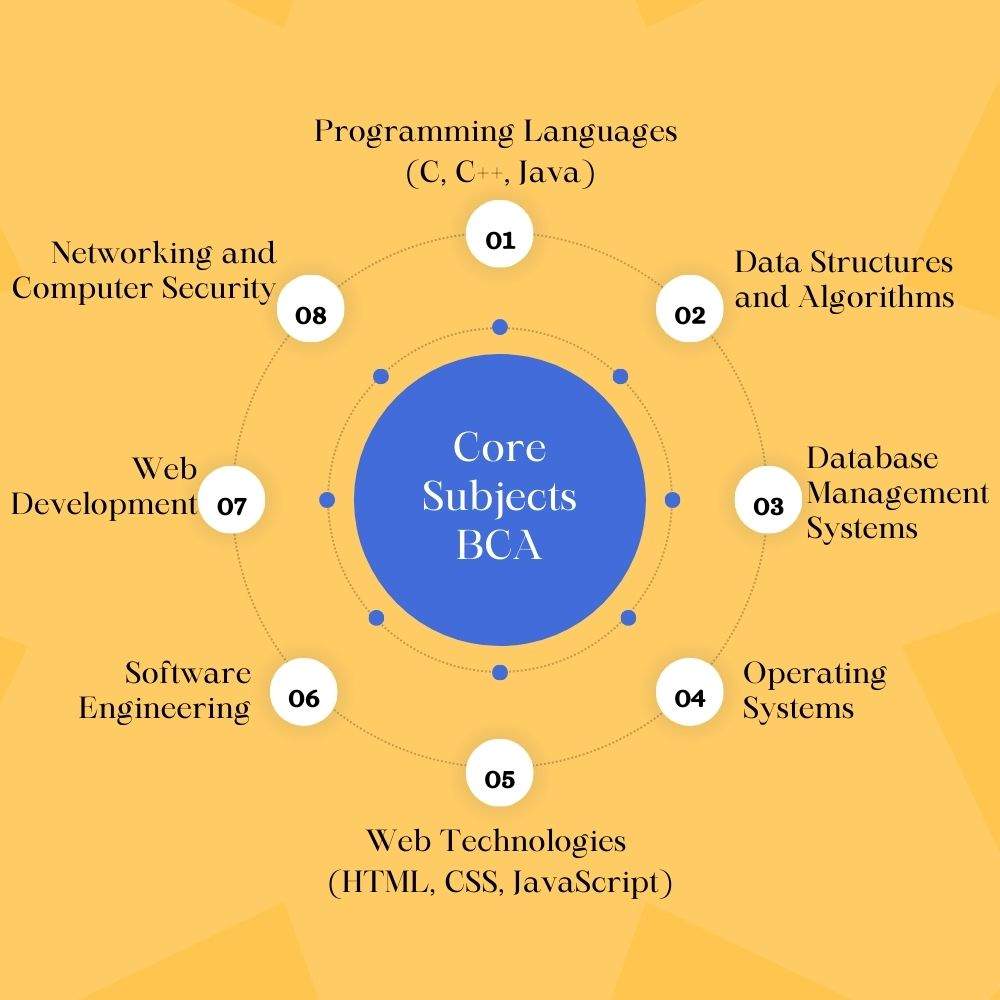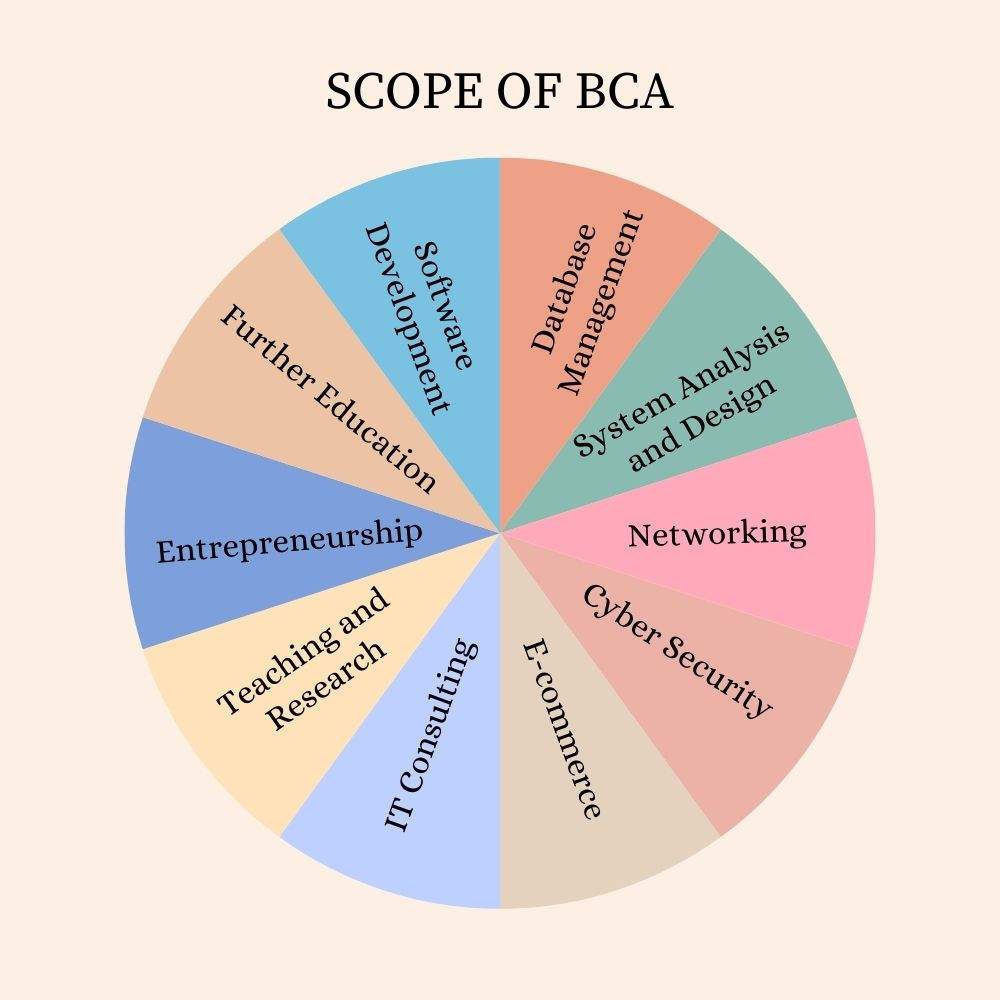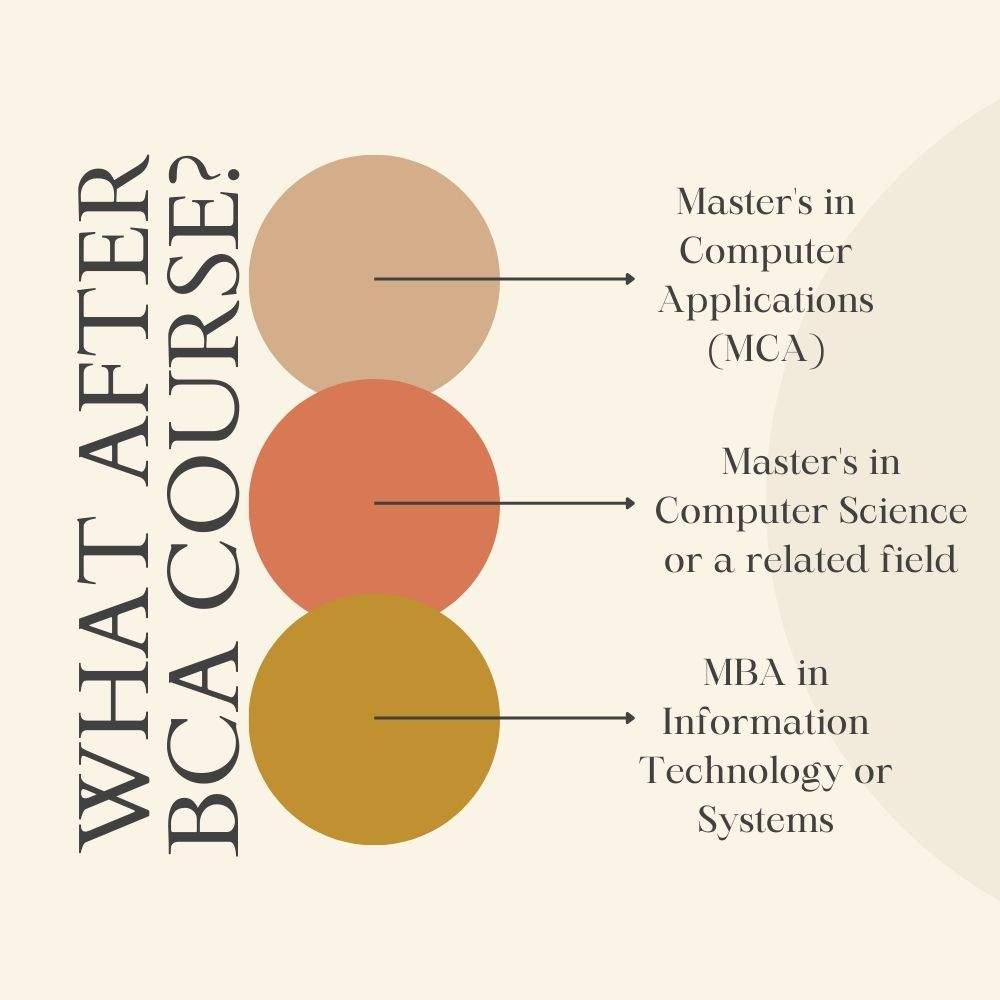What is BCA?
Bachelor of Computer Applications (BCA) is an undergraduate academic degree program that focuses on computer applications and software development. It is a three-year program typically offered by universities and colleges worldwide. The curriculum of a BCA program covers a range of subjects related to computer science, programming, software development, and computer applications.
| Aspect | Details |
| Full Form | Bachelor of Computer Applications |
| Duration | 3 years (6 semesters) |
| Eligibility | 10+2 with Mathematics or Computer Science |
| Course Type | Undergraduate |
| Objective | To provide a strong foundation in computer science |
| Curriculum | – Programming languages (C, C++, Java) – Data Structures and Algorithms – Database Management Systems – Operating Systems – Web Technologies (HTML, CSS, JavaScript) – Software Engineering – Networking and Computer Security |
| Skills Developed | – Programming and coding skills – Problem-solving abilities – Software development skills – Database management skills – Communication and teamwork |
| Job Opportunities | – IT Companies – Software Development Firms – Banks and Financial Institutions – Government Agencies |
| Higher Education | MCA (Master of Computer Applications) |
The essentials of a BCA course typically include a combination of theoretical knowledge and practical skills related to computer science and information technology. So, here are some key aspects of a BCA course:
Core Subjects:

- Programming Languages: Learn languages like C, C++, Java, Python, etc.
- Data Structures and Algorithms: Understand the fundamentals of organizing and managing data.
- Database Management Systems (DBMS): Study concepts related to database design and management.
- Operating Systems: Gain knowledge about the basic principles and functions of operating systems.
- Computer Networks: Understand the basics of networking and communication protocols.
- Web Development: Learn web technologies i.e. HTML, CSS, JavaScript, and server-side scripting.
- Software Engineering: Study the principles and methodologies of software development.
Practical Skills:
- Programming and Coding: Develop hands-on coding skills in various programming languages.
- Project Work: Engage in practical projects to apply theoretical knowledge.
- Lab Sessions: Work in computer labs to gain practical experience in programming and system analysis.
Eligibility Criteria
- Educational Qualifications:
- The candidates’ 10+2 education must have been completed by an accredited board or an equivalent, also the qualifying examination should include mathematics as one of the subjects.
- Minimum Percentage:
- Many institutions have a minimum percentage requirement for admission. This can vary but is often around 50% or higher in the aggregate of the qualifying examination.
Scope of BCA

The scope of Bachelor of Computer Applications (BCA) is broad and offers various opportunities in the field of information technology and computer applications. The following are a few facets of BCA’s scope:
- Software Development: BCA graduates can pursue careers in software development, designing, and programming. Also, they may work as software developers, application programmers, or web developers.
- Database Management: With a strong understanding of databases, BCA graduates can work as database administrators, managing and maintaining databases for organizations.
- System Analysis and Design: BCA graduates are equipped with skills to analyze systems and design solutions. They can work as system analysts while ensuring efficient and effective IT solutions for businesses.
- Networking: BCA graduates can enter the field of networking, working as network administrators or system administrators, hence managing and maintaining computer networks.
- Cyber Security: With the increasing importance of cybersecurity, BCA graduates can specialize in this field, focusing on protecting computer systems and networks from security breaches.
- E-commerce: BCA professionals can work in the e-commerce sector, managing online platforms, developing e-commerce websites, and ensuring secure online transactions.
- IT Consulting: BCA graduates can provide consulting services to businesses, moreover offering expertise in implementing and managing IT solutions to improve efficiency and productivity.
- Teaching and Research: BCA graduates can choose a career in academia, teaching computer applications and contributing to research in the field of information technology.
- Entrepreneurship: Some BCA graduates choose to start their own IT-related businesses, such as software development firms, web development agencies, or IT consulting services.
- Further Education: BCA serves as a foundation for higher education in computer science and related fields. Graduates can pursue master’s programs like MCA (Master of Computer Applications) for deeper specialization.
BCA Curriculum:
First Year:
Semester I:
- Mathematics-I
- Computer Fundamentals and Programming in C
- Business Communication
- Principles of Management
- Computer Laboratory and Practical Work (C Programming)
Semester II:
- Mathematics-II
- Data Structures using C
- Digital Electronics
- Computer Organization and Architecture
- Computer Laboratory and Practical Work (Data Structures using C)
Second Year:
Semester III:
- Discrete Mathematics
- Object-Oriented Programming using C++
- Database Management System (DBMS)
- Statistical Techniques
- Computer Laboratory and Practical Work (OOP using C++)
Semester IV:
- Numerical Methods
- Java Programming
- Operating Systems
- Software Engineering
- Computer Laboratory and Practical Work (Java Programming)
Third Year:
Semester V:
- Web Technology
- NET Framework and C#
- Systems Analysis and Design
- Computer Networks
- Computer Laboratory and Practical Work (Web Technology and C#)
Semester VI:
- Advanced Java Programming
- Mobile Application Development
- Artificial Intelligence
- Project Work
- Computer Laboratory and Practical Work (Advanced Java and Mobile App Development)
Electives (Optional):
Depending on their interests, students may be able to select elective courses. Elective subjects can include topics i.e. Data Science, Machine Learning, Cyber Security, Cloud Computing, etc.
Internship/Project:
Many BCA programs include an internship or a final-year project where students get hands-on experience in a real-world setting.
Top Recruiting Companies

However, certain types of companies are known for hiring BCA graduates due to their focus on IT and computer-related roles. Here are some types of companies that often recruit BCA graduates:
1. IT Services and Consulting Companies:
- TCS (Tata Consultancy Services)
- Infosys
- Wipro
- Cognizant
- HCL Technologies
2. Software Development Companies:
- Microsoft
- Oracle
- IBM
- SAP
- Adobe
3. E-commerce and Technology Giants:
- Amazon
- Flipkart
4. Finance and Banking Institutions:
- Goldman Sachs
- JPMorgan Chase
- Bank of America
- Wells Fargo
5. Telecommunications Companies:
- Verizon
- AT&T
- Vodafone
- Ericsson
6. Healthcare IT Companies:
- Cerner Corporation
- Siemens Healthineers
- Epic Systems
7. Startups:
Startups in the technology and IT sector often provide opportunities for BCA graduates to work on innovative projects.
8. Government Agencies:
Various government departments and agencies also hire BCA graduates for roles related to IT and computer applications.
9. Multinational Corporations (MNCs):
MNCs in various industries, including manufacturing, retail, and logistics, often have IT departments that hire BCA graduates.
10. Consulting Firms:
- Accenture
- Deloitte
- Ernst & Young (EY)
- PricewaterhouseCoopers (PwC)
Salary
The salary of a Bachelor of Computer Applications (BCA) graduate in India can vary based on several factors such as the individual’s skills, experience, the company they work for, and the location of the job. Here is a general idea of the salary range for BCA graduates in India:
- Freshers/Entry Level: BCA graduates starting their careers can expect a salary ranging from ₹2.5 lakh to ₹4.5 lakh per annum, depending on the company and location.
- Mid-Level Experience (2-5 years): With a few years of experience, BCA professionals can earn between ₹4.5 lakh to ₹7 lakh per annum.
- Experienced Level (5+ years): Those with more than five years of experience may earn salaries upwards of ₹7 lakh per annum, and it can go much higher for highly skilled professionals.
What After the BCA Course?

After completing a Bachelor of Computer Applications (BCA), there are several paths you can consider for further studies or career options. Here are some common options:
- Master’s in Computer Applications (MCA): Many students pursue a Master’s in Computer Applications to deepen their knowledge in the field of computer science and gain specialized skills. Overall, MCA programs typically cover advanced topics in software development, database management, networking, and more.
- Master’s in Computer Science or a related field: You can also opt for a Master’s degree in Computer Science, Information Technology, or a related field. However, These programs often provide a broader perspective on computer science and allow you to specialize in areas such as artificial intelligence, data science, cybersecurity, etc.
- MBA in Information Technology or Systems: If you are interested in combining your technical skills with business knowledge, pursuing an MBA (Master of Business Administration) with a focus on Information Technology or Systems could be a good option.
- Certifications: Consider acquiring certifications in specific technologies or platforms. Certifications can enhance your employability and demonstrate your expertise in areas like programming languages, databases, cybersecurity, cloud computing, and more.
Conclusion:
To sum up, pursuing a Bachelor of Computer Applications (BCA) not only imparts fundamental knowledge in programming, database management, and web development but also equips graduates with the skills needed for lucrative careers in software development, system analysis, and beyond. As technology continues to advance, BCA serves as a versatile gateway, offering opportunities for specialization through further studies or certifications, making it a valuable asset for those seeking a dynamic and rewarding path in the field of information technology.

